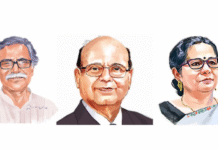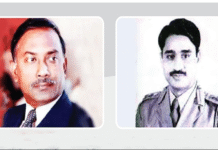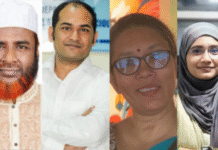The AL went ahead with the election, got its pound of flesh, and now the nation bleeds
When Shylock demanded his pound of flesh after Antonio had failed to repay his loan on time, the legality of his claim could not be challenged. Portia, the lawyer defending the hapless Antonio, could not contest the letter of the contract. However, it was by strictly following the letter of the contract herself that Portia upended Shylock, arguing that he could have his pound of flesh but not spill a single drop of Christian blood.
No such legal quibble was possible for Bangladesh. The AL went ahead with the election, constitutionally correct, got its pound of flesh – to continue with the analogy – and now the nation bleeds. That’s one possible way to see the elections.
More than 20 people lost their lives, voter turnout was embarrassingly low with some centres getting no voters at all, minority groups were terrorised and killed, and there was violence and vote-rigging in many centres. It was the “deadliest” election, according to one non-vernacular newspaper.
At a press conference held the day after the elections, the honorable prime minister’s mood was unapologetically celebratory. She thanked the people for their “spontaneous” participation in the polls, and emphasised that the 10th national election was a triumph of peace and democracy – it ensured the continuity of the constitution, and upheld the spirit of liberation. Momentarily though, she did raise a question about Hasanul Haque Inu’s concern about democracy in an aside, now viral on the internet. That’s another spin on the elections.
Tofael Ahmed, in his characteristic full-throated manner, declared just hours after voting ended that the election was a victory for democracy. Osman Faruk, current spokesperson for the BNP-Jamaat alliance, dubbed the “one-party election” a farce of democracy. He announced a 48-hour hartal starting Monday morning.
Both positions are partisan, predictable, and not necessarily fully or equally defensible. This debate will go on for some time. TV talking heads will be tying up their tongues with their pseudo-academic sophistries, defending this position or that.
One question that keeps coming up in this debate is the role of some intellectuals who strongly and passionately argued that the 10th national election should be cancelled, and who appealed to the PM to do so. Within this group (I refer to the seminar organised on December 29), there were indeed some known BNP-Jamaat types masquerading as free-thinking intellectuals. We know who they are, and we discount them on the basis of their affiliations and utterances.
But there are those civil society members on whom serious aspersions were cast in another seminar organised and attended by pro-AL intellectuals just one day before the election. And that needs to be countered. Zafar Iqbal, writer and professor, well-known and well-liked by many (including many he was critical of), said that those intellectuals who were in favour of cancelling the elections were really trying to give an opportunity to Jamaat to contest the elections. This is a palpable falsehood.
To conflate the issue of a non-inclusive election with the issue of Jamaat and the trial of war criminals is intellectually and politically indefensible. Zafar Iqbal should have known better. All you need to do is to look at the political credentials of the people who were opposed to the January 5 election and their public stand about Jamaat and the trial of the war criminals.
When one reporter asked the PM in the press conference on January 6 whether the Communist Party of Bangladesh, which was against the election, could be considered to be a party against the spirit of liberation and against the trial of the war criminals, a party that sought to give an opportunity to Jamaat to participate in the polls, the PM did not have a straight answer.
The PM’s answer was in the evasion of the question – and that was very prudent of her. The answer is simply this: That CPB was against the election of January 5, and it has been historically against the politics of Jamaat and continues to be so, and the two positions are not mutually exclusive. This, I think, is exactly the position of the intellectuals and civil society members whom Zafar Iqbal had taken to task.
Now that the election is over and, constitutionally, the AL will form a new government soon, there is one positive outcome that many will hope for. The ruling party has bought some time, at a heavy price perhaps, and now can at least go ahead with the trials of the war criminals.
Source: Dhaka Tribune










